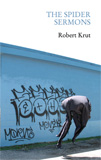Review by Haley Larson
BlazeVOX [books]
14 Tremaine Ave.
Kenmore, NY 14217
ISBN 9781935402121
2009, 72 pp., $16.00
http://blazevox.org
Robert Krut’s newest collection of poems, The Spider Sermons, crawls with surprising grace through disheartened gloom. What could easily have evolved into a “world is dark” mentality instead crafts a magical underlying hopefulness, a set of eyes which grope and pull from all reaches of the universe in the hopes of something steadfast—an answer perhaps, even God. Krut exploits this universe in his images, teases its imbalance and imperfection into a meaningful yet questionable establishment of our existence. With a most musical and loaded pulse, the weighty meditations of his poems envelop the reader through a guided rise and fall of sound and imagery, still presenting enough dissonance to avoid a pretty package of clichés.
The dissension of recurring images creates balance, yet Krut always keeps us a bit uneasy–as though the next line might tip the scales, catapulting over a desperate edge. Growth and convergence are readily tangible, and they feed each other within stanzas and even single lines. In one poem, we are engulfed in fire and water, God and man, heaven and earth. Such images swell then narrow, and a resulting energy churns throughout this poet’s work. For instance, from “Tear Logic,” the image of God’s “tears the size of Asia forming oceans” brilliantly focuses into a stark assertion:
But you don’t believe in God,
and it’s you-
your own feet in a puddle wet
with your own tears-Looking for creation, and admitting
somewhat regretfully,
somewhat sadly for knowing
that it starts right here.
Krut’s imagery creates distance and space. As a reader, that changing volume is transformative, allowing that I may become smaller, larger, more significant, or less concrete than I truly am. In “Lava Sphere, Sky Sphere,” the distance from subject to object quickly morphs in the lines: “…on an unnamed Walk of Fame star, / just past dusk, looking up, / thinking she can touch a plane above her.” I encounter a tangible shift in spacial awareness from a small iconic street marker to a flying vehicle filled with people, thousands of feet above earth.
The images themselves create moments of delight in metaphors and thoughtful disparity, often speaking to a greater wondering of our authenticity. One returning comparison in Krut’s poems includes that of stone and the body. In “Gravitypants Rocketboy,” Krut creates a fragile image: “…when I was young, I moved with the grace // of a pair of cement legs on glass-face earth.” Physical fragility and furthermore human fragility are in question throughout much of the book. Building on this, in “If, Then,” a stunning moment plays within the words:
a dragon loosens itself as fog
from the cliffs, inhales.Tail of the beast,
lifted cloud scales, the strongest
for knowing this all
does not exist.
The final few lines, from an image of nature breeding mystical nightmare, emphasize the question that echoes throughout this collection of poems: what is truth and what is fiction?
Krut’s use of musicality blends suppleness with cacophony. Both consonance and assonance are at great use within this collection. For example, in “Misplaced Child,” Krut crafts velvety lulls that rise and fall through a small boy who “watches a locust sail / the silk face of a lily pad.” “The Bakery” vividly contrasts this elasticity in its spondaic opening stanza:
In a ginger-bake skull home,
an oven hut ash face,
a forest-armed grasp-force
pulls capes near from ghosts.
Additionally, in “Neon” Krut creates a melodic stanza through skillful assonance: “Swallowing hot broth, the thought: / we do not become more enlightened / with each life at all.” This crescendo and decrescendo of sound mirror the parallel manipulation of space within his images. It is here, in the relationship between musicality and image, that Krut demonstrates his craft, a craft well worth consuming.
Krut’s use of musical techniques and imagistic balance allow his poems to breathe in the midst of otherwise bleak and beaten realizations, a sermon of wonder and hopelessness begging to be proven wrong. While such an examination of existence holds the potential to fall flat in the hands of a trite poet, Krut weaves life and thus significance into this inspection. Kazim Ali tidily summarizes the tumultuous zeal that brilliantly converges within this collection of poems: “It’s the most passionate of come-ons, but with the kindest of intentions.”
Truth versus fiction. Krut’s own words from “Rope” present a startling assertion: “…I can have what I want, but if I am blind / I don’t have to choose.” Krut’s work assures us that the universe provides plentiful distraction, enough that we may never have to choose between the two.
Comments are closed.